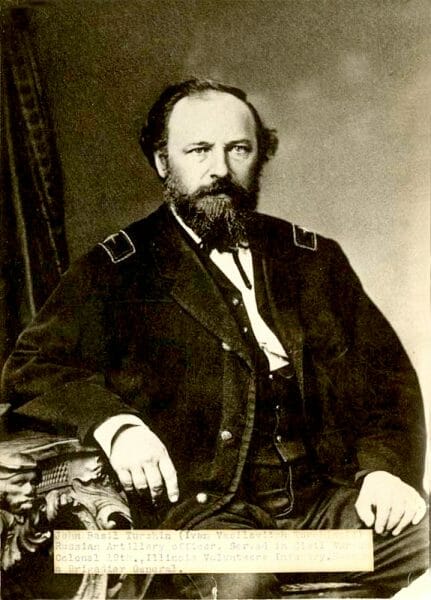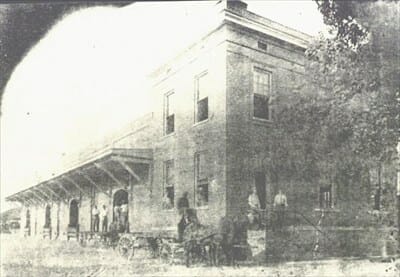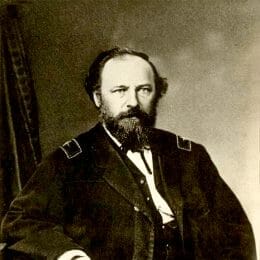Sack of Athens
Located in the upper north-central part of Alabama in Limestone County, the city of Athens was the scene of a Civil War confrontation in May, 1862, in which federal troops pillaged civilian property and committed other atrocities. The episode resulted in the court martial of U.S. Army colonel John B. Turchin, but the episode and the issue of the federal policy of conciliation—the respect of southern property and rights—to avoid bitterness, prompted U.S. military leaders to rethink how the war should be prosecuted to solidify support from an increasingly war-weary Northern populace.
 John Basil Turchin
After the defeat of Confederate forces at Shiloh, Tennessee, in the spring of 1862, middle Tennessee and north Alabama became untenable for the Confederate military. With Confederate forces out of the way, Gen. Ormsby M. Mitchel’s Third Division, Army of the Ohio, swarmed into Huntsville on April 11, 1862, to secure the important north-south Decatur and Nashville railroad. Nearby Athens possessed an important depot on the Nashville and Decatur railroad line that would prove beneficial to the U.S. Army, and on April 27, two Ohio units occupied the town.
John Basil Turchin
After the defeat of Confederate forces at Shiloh, Tennessee, in the spring of 1862, middle Tennessee and north Alabama became untenable for the Confederate military. With Confederate forces out of the way, Gen. Ormsby M. Mitchel’s Third Division, Army of the Ohio, swarmed into Huntsville on April 11, 1862, to secure the important north-south Decatur and Nashville railroad. Nearby Athens possessed an important depot on the Nashville and Decatur railroad line that would prove beneficial to the U.S. Army, and on April 27, two Ohio units occupied the town.
The citizenry of Athens may not have minded the federal troops in their midst. The town had previously displayed considerable Unionist sentiment. Townspeople had voted for the Northern Democrat Stephen Douglas in the 1860 election and had burned an effigy of Alabama’s virulent secessionist senator William Lowndes Yancey during the secession debate. Athens mayor William P. Tanner later stated that the American flag had remained atop the courthouse for more than two months after the state seceded. Tanner also noted the citizens of the town found the occupying federal troops to be orderly and restrained.
The peaceful occupation that the citizens of Athens had enjoyed ended on May 1, 1862, with the appearance of the Confederate First Louisiana Cavalry. These troops easily pushed the federal troops out of town and toward Huntsville, and the withdrawal of the Eighteenth Ohio quickly turned into a rout. During the retreat, some members of the Ohio unit believed that the citizens of Athens acted in concert with the Confederate cavalry by firing on the retreating U.S. columns.
According to Colonel Turchin’s court-martial proceedings, federal soldiers on the return trip to Athens the following day reportedly threatened revenge. Many soldiers were under the impression that General Mitchel wanted the town punished. The Eighth Brigade, under the command of Turchin, who was born in Russia and trained in its finest military school, stacked its arms on the courthouse lawn and proceeded to carry out what they believed were their orders.
The primary target for destruction was the Athens business district. The troops broke into the drugstore of William S. Allen and destroyed his medical library as well as surgical and dental instruments, and the soldiers stole parts of skeletons from the office. They also stole some $3,000 worth of goods from Madison Thompson’s grocery store and destroyed the interior of Peterson Tanner and Sons Dry Goods. The soldiers extended the destructive activity into the homes of Athens residents, and two of them were accused of raping a 14-year-old enslaved girl at the home of Charlotte Hines.
Turchin was relieved of his command and ultimately court-martialed for dereliction of duty in the destruction of Athens and other offenses. Although he was found guilty, Turchin was later promoted to brigadier general and thus above the authority of the court. Athens would be occupied for the remainder of the war. At the end of his trial, Turchin advised that the U.S. troops should live off the land to destroy the South’s resources, as was the European custom of war making.
Some historians have recently postulated that U.S. leaders, both civilian and military, including Pres. Abraham Lincoln, began to realize the possible efficacy of harsher policies toward the rebellious South based on Turchin’s exploits. Such policies resulted in Gen. William Sherman’s “March to the Sea” and Gen. Philip Sheridan’s despoiling of the Shenandoah Valley in Virginia, depriving the Confederacy of needed provisions. Although these acts hastened the end of the Civil War, they also became engrained in the southern memory, fostering the views that became embodied in Lost Cause ideology.
Further Reading
- Bradley, George C., and Richard L. Dahlen. From Conciliation to Conquest: The Sack of Athens and the Court-Martial Colonel John B. Turchin. Tuscaloosa: University of Alabama Press, 2006.
- Dunnavant, Robert Jr. Decatur, Alabama: Yankee Foothold in Dixie, 1861-1865. Athens, Ala.: Pea Ridge Press, 1995.
- Storey, Margaret M. Loyalty and Loss: Alabama Unionists in the Civil War and Reconstruction. Baton Rouge: Louisiana State University Press, 2004.





